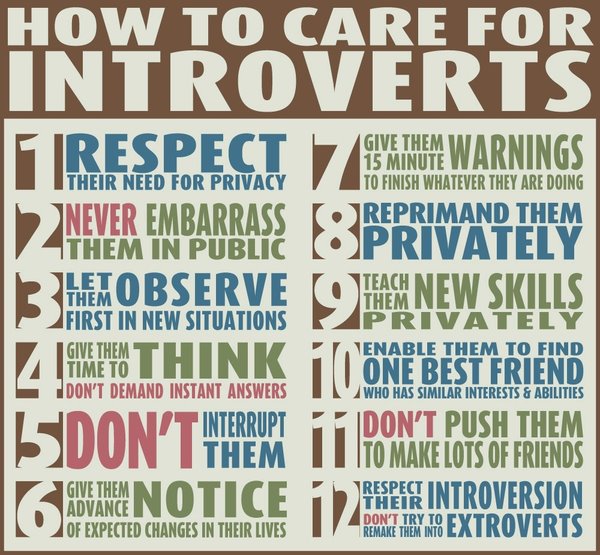The above graphic has been floating around social network sites for a while now and I’d just like to thank the original creator – whoever you might be – you summed things up beautifully. My only hesitation is not about the content but the way it is laid out like a checklist. I may be reading too much into this, but it seems to present introverts as needing levels of care not required by “normal” folks. Which is not the case, thanks. Sure, we’re a relative minority but without us, society would be well short on its writers, musicians, artists, actors, scientists, doctors, mathematicians…
Other people have covered the topic in greater detail (links below) but new brain scanning and research methods have revealed that introverts process information differently, with far more activity in the part of the brain responsible for contemplation and analysis (yes, really). This obviously requires more time and personal space and makes introverts prone to overload but it is hardly a defect. In fact, research suggests that introversion increases with IQ and giftedness (again, yes, really :-)).
The current view of introversion as a social issue has a lot to do with the increasing pace of life and the way Western society now disproportionately rewards extroverts. When was the last time you saw an ad showing introverts looking chill? This is one of the reasons I feel comfortable living in Japan, where introverts are more accepted. It’s different but somehow society seems to keep functioning. The truth of the matter is the world needs both people of action and people of thought and, yep, everyone in between.
If you’re an introvert, you’ll need to learn a few strategies for carving out your own space but step one is just to realize it’s fine, you’re fine. I know I spent years trying to learn how to play well with others and ultimately just stressing myself silly. That’s not to say you can’t or shouldn’t try to develop extrovert tendencies; the wider your skill set, the better. But first figure out how your brain processes information and create the right conditions so you can excel at whatever it is you do best. You’ll be a lot more successful.
Other details and resources
The power of introverts (TED presentation by Susan Cain)
Caring for your introvert (Atlantic newspaper article by Jonathon Rauch)

